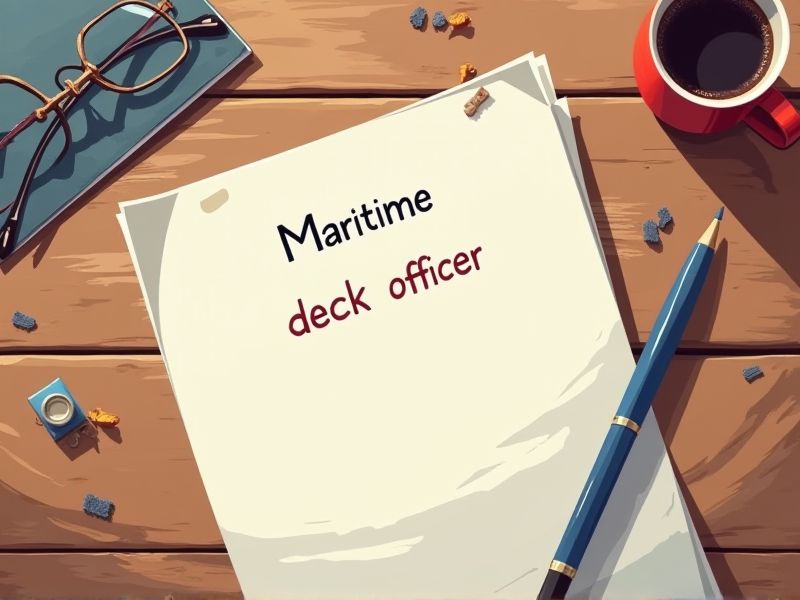
The role of a Maritime deck officer demands a specialized skill set, primarily due to the complex and dynamic nature of marine operations. Certifications ensure officers possess critical competencies essential for safe navigation, emergency response, and vessel management. Regulatory bodies and international laws mandate these certifications to uphold maritime safety standards. Some important certifications you may need as a Maritime deck officer include these essentials.
STCW Basic Safety Training
STCW Basic Safety Training equips maritime deck officers with essential survival techniques for emergency situations at sea. International maritime regulations require compliance with STCW standards to ensure safety and security on board vessels. Training covers firefighting, sea survival, and first aid, which enhances the officers' capability to manage onboard emergencies. Competency in safety procedures directly influences the overall safety culture and risk management aboard ships.
STCW Advanced Firefighting
STCW Advanced Firefighting training equips maritime deck officers with the skills to manage onboard fire emergencies effectively. Regulations require officers to possess advanced firefighting skills to minimize the risk of fire-related incidents at sea. Officers trained in advanced firefighting contribute to safer maritime operations by enabling rapid response and effective coordination during fire emergencies. The course enhances understanding of fire prevention and control, critical for maintaining safety standards on vessels.
STCW Survival Craft and Rescue Boat Training
STCW Survival Craft and Rescue Boat Training enhances a maritime deck officer's ability to effectively manage life-saving operations in emergencies. The training provides practical skills essential for launching, navigating, and deploying survival craft and rescue boats. This capability reduces the risk of casualty during maritime incidents involving vessel abandonment. Adhering to these internationally recognized standards ensures a uniform level of preparedness among deck officers, contributing to global maritime safety.
GMDSS Operator Certification
Having a GMDSS Operator Certification ensures maritime deck officers are proficient in operating the Global Maritime Distress and Safety System, which enhances communication in emergencies. This certification equips officers with necessary skills to manage digital distress alerts effectively, crucial for maritime safety. Regulatory bodies often mandate GMDSS certification to comply with international maritime safety standards and protocols. The certification bolsters the officer's credentials, increasing employability and preparedness for diverse maritime roles.
Ship Security Officer (SSO) Certification
The SSO Certification enhances a maritime deck officer's competency in managing and mitigating security threats aboard a vessel. International regulations, particularly the International Ship and Port Facility Security (ISPS) Code, mandate this certification to ensure standardized ship security practices. With the SSO Certification, deck officers acquire essential skills for identifying security risks and implementing appropriate countermeasures. Having certified security personnel aids in maintaining compliance with maritime laws and fosters a safe environment for crew and cargo.
Bridge Resource Management (BRM) Training
Increased situational awareness can result from Bridge Resource Management (BRM) Training, reducing the likelihood of human error. Effective communication and teamwork among crew members become more pivotal, enhancing safety and operational efficiency. Decisions made under pressure tend to be more informed and calculated, mitigating potential risks. The training aligns with regulations emphasizing structured problem-solving and decision-making on the bridge.
ECDIS Certification
ECDIS certification equips maritime deck officers with the skills to navigate using Electronic Chart Display and Information Systems, reducing the reliance on paper charts and thus minimizing human error. Regulations mandate ECDIS knowledge to ensure compliance with international maritime safety standards, enhancing the accuracy and safety of navigation. Certification empowers officers to maximize the system's capabilities, such as real-time data processing and automatic hazard alerts, increasing operational efficiency. Shipping industry trends show a significant shift towards digital navigation, making ECDIS expertise a crucial job requirement.
Maritime Radar Navigation Course
Maritime Radar Navigation Course equips deck officers with critical skills for detecting and monitoring vessels and obstacles in adverse sea conditions, enhancing navigational accuracy. Accurate data skills reduce the risk of collisions, ensuring the safety of both crew and cargo. Advanced radar interpretation improves decision-making during limited visibility scenarios, such as fog or night operations. Proficiency in radar operation complies with international maritime regulations, supporting vessel certification and operational standards.
Marine VHF Radio Operator Certificate
A Marine VHF Radio Operator Certificate is essential for maritime deck officers because it ensures they can effectively communicate for navigation and safety at sea. This certification validates that the operator understands international marine frequencies and distress signal protocols, which are crucial for emergency response. Lack of this certificate can result in miscommunication, increasing the risk of maritime accidents and endangering lives. Regulatory authorities globally mandate this certification, reflecting its critical role in maintaining maritime safety standards.
Maritime English Proficiency Certification
Maritime English Proficiency Certification is crucial because it ensures that maritime deck officers can effectively communicate in the international maritime industry. According to safety regulations, miscommunication is a leading cause of shipping accidents, and certified proficiency reduces this risk. The certification also aligns with International Maritime Organization standards, providing a benchmark for competency. It facilitates career advancement by meeting employer requirements and demonstrating a commitment to professional development.
Summary
When you obtain certifications as a Maritime deck officer, your career opportunities expand significantly. The qualifications enhance your skills, increasing competence and safety awareness. The certifications often lead to higher earning potential and job security. Employers typically favor certified officers, resulting in better employment prospects.
